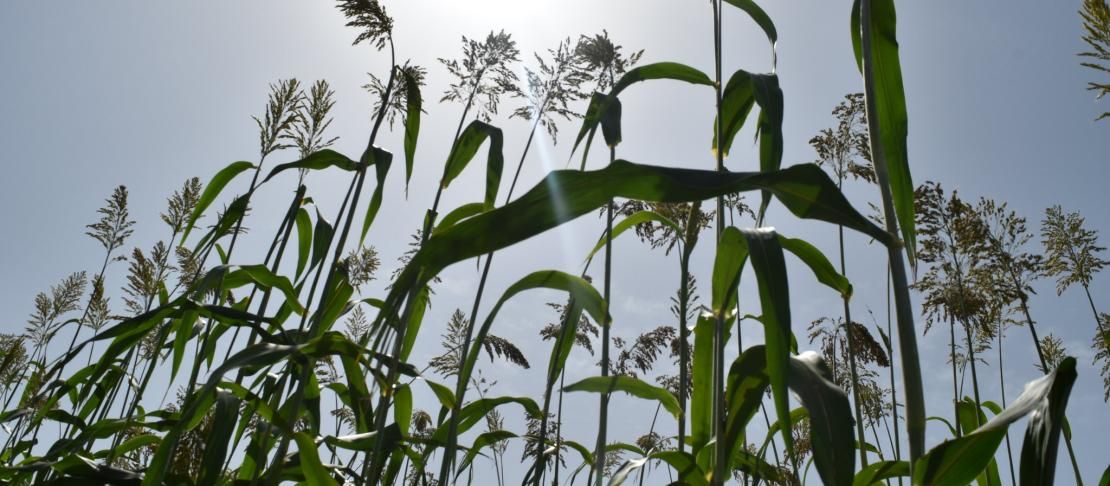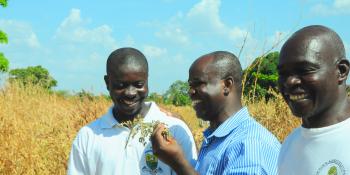Sharing lessons on sustainable climate-smart agriculture in Africa

CCAFS is participating in Africa's efforts to adapt agriculture to climate change through the African Union Development Agency.
According to Africa Renewal, West Africa has been identified as a climate-change hotspot, resulting in a higher risk of reduced crop yields and production, with subsequent negative effects on food security. The western part of Southern Africa is projected to become drier, with increasing drought frequency and a decrease in precipitation. The CGIAR Research Program on Climate Change, Agriculture and Food Security (CCAFS) aims to address the increasing challenge of global warming, such as the above, in addition to declining food security on agricultural practices, policies and measures through strategic collaboration.
CCAFS has established strategic multiscale partnerships, including one with the New Partnership for Africa's Development (NEPAD), the development agency of the African Union. In 2014 in Malabo, African member states adopted the Africa CSA Vision 25X25 which aims to support at least 25 million farm households in practicing climate-smart agriculture (CSA) by 2025. The African CSA Alliance Forum, through which the NEPAD Agency collaborates with all stakeholders and partners towards the attainment of Vision 25X25, was established in 2015.
The aim of the Africa CSA Alliance is to bring together relevant stakeholders who have contributed considerably to producing scientific evidence on transforming and reorienting agricultural systems. As an important contributor of scientific research within this field, CCAFS has participated in the forum. The 3rd Africa CSA Forum (27–28 March 2019 in Dakar, Senegal) presented a good opportunity to share experiences with peers, to identify interests and opportunities for common and complementary activities regarding agriculture within the climate change context.
CCAFS science for upscaling CSA
CCAFS, together with the partner from CSIR-Animal Research Institute (CSIR-ARI), showcased successful CSA technologies and practices and climate information services experience in Senegal. Dr. Mathieu Ouédraogo presented 'Implementing Climate-Smart Village (CSV) approach in West Africa: Key achievements and lessons learned for CSA upscaling' under the session 'Increasing and sustaining CSA adoption in smallholder systems: Strategies, lessons and insights from practice'. Dr. Ouédraogo presented the CSV approach as a sustainable solution for a better practice of CSA at large-scale in Africa.
"Climate-Smart Village approach addresses the need for proven and effective CSA options in a real-life setting and facilitates co-development of scaling mechanisms towards landscapes, subnational and national levels.”
Dr. Mathieu Ouédraogo, Scientist, CCAFS West Africa
The session 'Deploying ICTs for CSA programs in smallholder systems: Are we tapping the full potential?' included the presentation from Dr. Issa Ouedraogo (CCAFS West Africa): Using climate information services to manage climatic risks in the fisheries sector. The Coordinator of the Climate Information Service for Increasing Resilience and Productivity in Senegal (USAID/CINSERE) project has expressed the importance of weather and climate information services (WCIS) for fishermen in Senegal. WCIS constitute a major tool for risk management in the fisheries sector in Senegal.
Dr. Mathieu Ouedraogo from CCAFS West Africa presenting on #Climate-Smart Villages in West Africa as a way to increasing and sustaining CSA adoption in smallholder systems. pic.twitter.com/MqLLCwFV45
— CCAFS West Africa (@cgiarclimate_WA) March 27, 2019
Ansah Vincent Botchway, from CSIR-ARI, Ghana, presented on 'Cost benefit analysis of CSA practices utilization in the Guinea Savannah and forest agro-ecological zones of Ghana: Implications for CSA investment and scalability at subnational level'. Botchway shared examples on the most prevalent CSA practices and technologies in 6 districts in Ghana: "Ghana has embraced the drive for climate-smart agriculture (CSA) and our study has showed that crop-livestock integration and crop rotation were commonly used in the three districts of Guinea Savannah and use of manure, intercropping and the use of improve varieties/breeds were commonly practiced districts in the Forest Zone.”
The Forum also registered more presentations from the United States Agency for International Development (USAID), the Deutsche Gesellschaft für Internationale Zusammenarbeit (GIZ), National stakeholders, the Food and Agriculture Organization of the United Nations (FAO), Network for Youth Development (NfYD), the World Bank, etc. The 3rd Africa Climate Smart Agriculture Alliance Forum also encouraged dialogue and interaction amongst the African CSA community.
Read more:
Dansira Dembélé is the Communications Officer for CCAFS in West Africa.



